Contractor profile: Paramount Effluent
Specialising in effluent spreading, Paramount Effluent is going from strength to strength
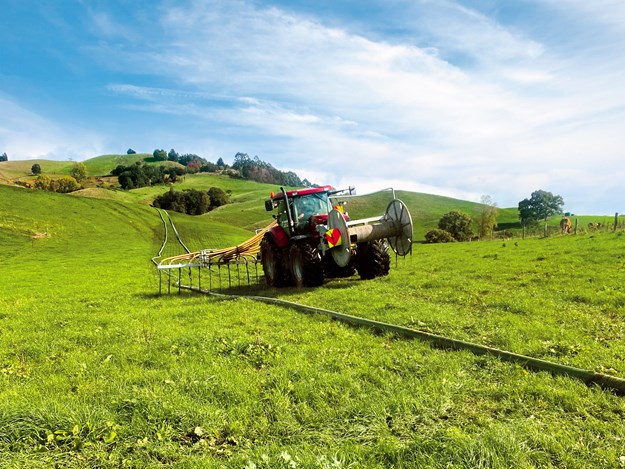 |
|
Paramount Effluent’s spreading tractor with dribble bar
|
Like most agricultural contractors, hard work and adapting to demanding conditions is second nature. Nick Wright from Paramount Effluent certainly ticks these boxes. On the day we caught up, he was juggling his usual workload with the fresh arrival of six puppies and
a new daughter.
Nick is no stranger to tackling new challenges. The challenging industry of effluent spreading requires constant adjustment and dedication, but Nick has no regrets about setting up his business Paramount Effluent in 2018.
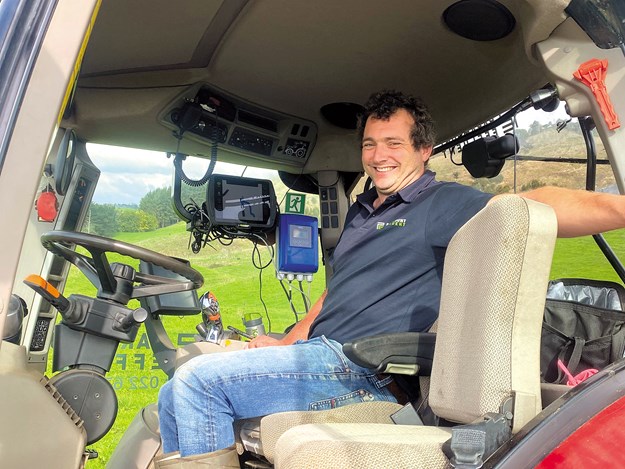 |
|
Nick Wright in what he calls his field office
|
After many years working for agricultural contractors and big corporate working at The Australian Wheat Board, Nick was ready for a new challenge. After looking for a unique opportunity, he noticed a lack of effluent pumping services in the Waikato region and thus Paramount Effluent was born.
Agriculture in his blood
Growing up on a sheep and beef farm in Martinborough, Nick has been interested in agriculture and machinery his whole life. This passion grew as he followed his interest to Lincoln University, where he completed a Bachelor of Commerce majoring in Agriscience and Accounting, before moving on to jobs here in New Zealand, as well as in Australia and Europe.
His love of the industry enabled him to travel extensively around the globe: working in Holland, Spain, Belgium, and Germany operating pea viners.
 |
|
The Case IH spreading tractor and pump tractor parked up beside another empty pond
|
Nick then worked in a corporate environment at The Australian Wheat Board as part of the logistic team, managing road freight across the eastern seaboard. It was a job he loved, but in 2016, New Zealand called him home.
Back on Kiwi soil, he worked for John Austin as a customer manager and later, for JSwap Contractors in their dispatch team. Learning valuable business lessons set him up to have the confidence to start and run his own business.
Effluent systems
It was in Holland that Nick was first introduced to his now good friends who have an effluent spreading company there, giving him the idea to bring the same system to the Waikato.
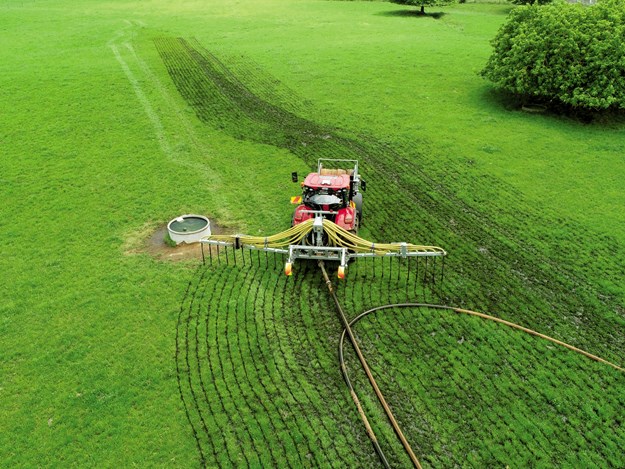 |
|
The challenges of working around troughs and trees is all part of the job
|
"I was keen to work for myself but wanted to add a new service to the region. There are many hay contractors and the like, and it’s a very competitive market, so I wanted to diversify from that," he says.
"I have good friends in Holland who are doing effluent over there. I watched them grow from just one machine to a 15 to 20-strong machine operation. They are quite a way ahead of us in effluent management and regulation, so I knew there was plenty of room for growth here."
State-of-the-art service
In 2018, keen to invest in his own business, Nick saw a gap in the market for a specialised effluent contractor in the Waikato and jumped at the opportunity. He was excited at the prospective value his services would offer to farmers, assisting them with the ever-changing environmental regulations, while adding to their bottom line and saving them money.
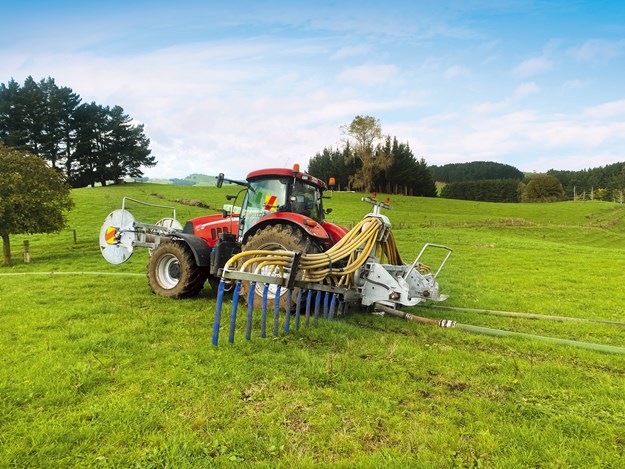 |
|
The dribble bar showing hose connection, which swivels and pivots as required when turning
|
In his typical non-complicated fashion, Nick invested in a new Case IH tractor, which he chose simply because he got the best deal on it at National Agricultural Fieldays®. His gear also involves 1.6km of flat lay hose and the umbilical system, which is made up of the dribble bar with a knife within, which cuts out any of the lumps that might try to come through and clog up the lines. The umbilical system is home-built.
"It is all really simple machinery", he explains. "There’s not a lot of maintenance involved, and importantly it’s reliable and reduces potential problems that might arise."
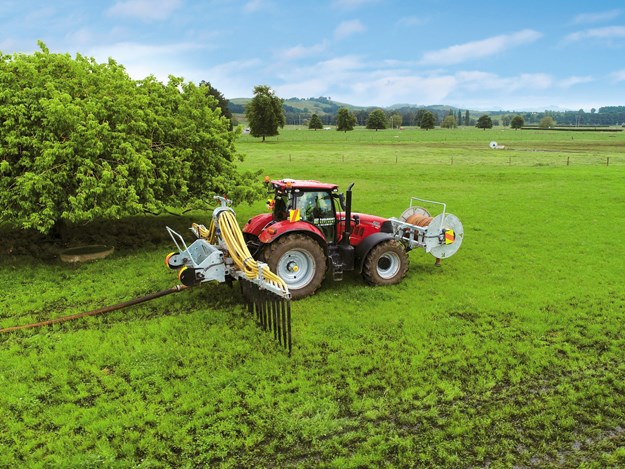 |
|
Nick never tires of the rural views his job affords
|
Nick has a 140hp Case IH tractor at the pond also, which pumps effluent through the hose and to the umbilical system for spreading. Nick also uses GPS/TracMap for proof of placement, showing everywhere he has been and the rate the effluent was applied, giving farmers that extra peace of mind that they are receiving good value.
Nick’s system protects waterways, complying with regulations while simultaneously improving the farm’s system, reducing fertiliser costs and spreading nutrients that are most compatible with the natural environment. His service enables farmers not to have to worry about rates in which to apply to ensure maximum benefit.
"The umbilical spreading system is superior to other options out there, as I can get almost 100% coverage to the paddock. In my opinion, it offers a huge advantage over-irrigation spraying, as you know exactly where it has gone, and there’s no potential for it to drift to sites not wanted and no chance of ponding.
 |
|
Dribble bar dropper hoses reduce spraying and keeps the job tidy
|
"Another added benefit is that it is far easier to make sure the effluent is clear of waterways.
"Being able to spread effluent evenly over the full length and width of the paddocks makes it an ideal system for maize and other cropping ground," he explains. "We can also pump up to 15% solids increasing overall pond capacity."
Nick particularly enjoys providing effluent solutions for farmers, so they don’t have to worry about it at their end.
"They don’t have to invest in their own gear and put in the work when they already have so much to do," he explains. "This is a tidy way of doing it with far less mess and wear on raceways compared with tankers or moving irrigators, and there’s no interruption to stock moving around the farm."
The umbilical high output system for pumping and spreading large volumes of effluent in a short space of time is an environmentally friendly way of pumping effluent, with the capability of pumping up to 1.5 million litres of sludge per day.
Making the most of effluent
Effluent is a natural, dilute liquid fertiliser containing nitrogen, phosphorus, potassium, magnesium, sulphur and other trace elements that would typically be included in the purchase of fertiliser, so utilising on-farm effluent presents the perfect opportunity to capitalise on a cost-effective resource that’s already on the farm. Dairy NZ estimates the average dairy cow produces around $25 worth of nutrients annually as effluent, adding up quickly as herd numbers increase.
Nick has worked on many farms in spring, spreading effluent in the paddocks before maize is planted and then returning once it is harvested.
"A lot of farmers are catching on to putting effluent back on to replace the nutrients lost in the harvest," he says.
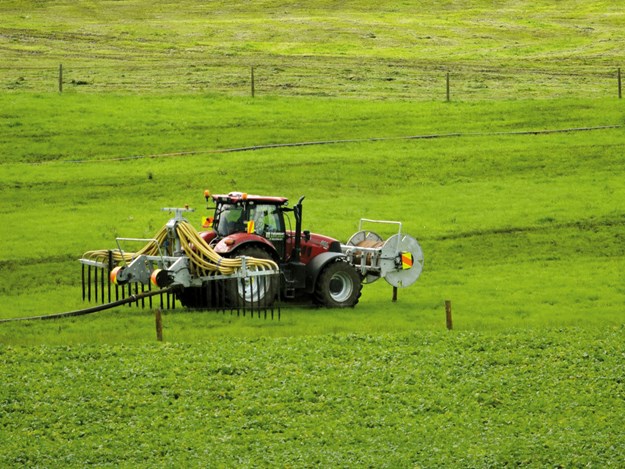 |
|
Specialising in effluent management and irrigation
|
"It’s smart because the nutrients are just sitting there waiting to be used, which you would only be paying for otherwise in fertiliser costs."
His busiest seasons typically run alongside other contractors. Still, there are always emergencies that crop up throughout the year where a farmer urgently needs a pond emptied, and he also has a few clients with smaller ponds who are on a six to eight-week cycle.
"It’s always satisfying to see an empty pond at the end of the job, and the farmers are usually rapt with the job," he says. "Being out in the community as an agricultural contractor is actually a gratifying job."
Rewards outweigh the challenges
As any farmer or contractor would relate, a business that relies on machinery is always challenging.
"The hose is really delicate to wind up. If it goes in the wrong place, then it cuts in half, so it’s a write-off, and one length of hose is around $12,000, so it pays to be careful."
Nick also finds marketing can be a bit of a challenge.
"Convincing and educating farmers around why effluent spreading is good for their farms is tough. I am not a salesman," he laughs. "I don’t like to feel like I’m telling people what to do with their farms, so I really rely on word-of-mouth testimonials.
"I also understand that a lot of farmers have invested heavily in their own system, so they don’t always want to spend more for me to do what they possibly could do themselves."
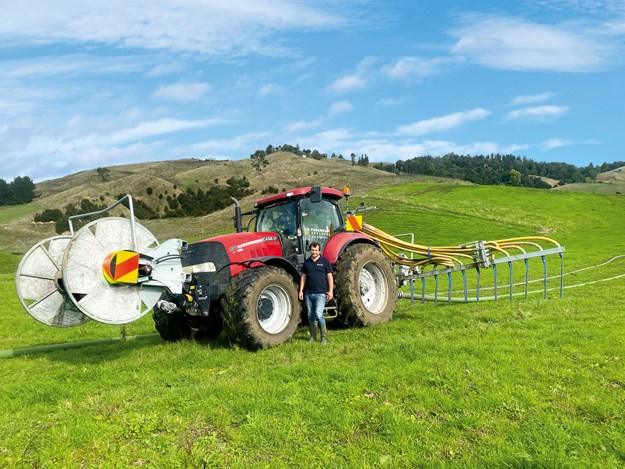 |
|
Nick beside his spreading tractor
|
However, once farmers see Nick in action and understand the benefits of his service, they see the environmental and economic benefits and are keen to book him in at their farms.
Nick is happy with how the business is growing, especially on the back of a tough year with COVID slowing things down, and growth has really picked up this year.
"I think some farmers who missed last year are catching up now, so I am getting a lot more bookings at the moment, keeping things busy," he says. "My plans are to just continue steadily growing the business until I can employ someone full=time to operate the tractor and umbilical system and then have casual labour and myself on the pump at the pond."
At the time of the interview, Nick and his partner had just welcomed their second child two weeks earlier, as well as a new litter of five Labrador puppies only one hour earlier that day. It’s safe to say Nick has his hands full juggling Paramount Effluent and his young family.
Find new and used farm machinery for sale in NZ
Keep up to date in the industry by signing up to Farm Trader's free newsletter or liking us on Facebook


.jpeg)
.jpg)
.jpeg)

.jpg)
.jpeg)
.jpg)
.jpeg)

.jpg)
.jpg)
.jpg)
.jpg)
.jpg)

